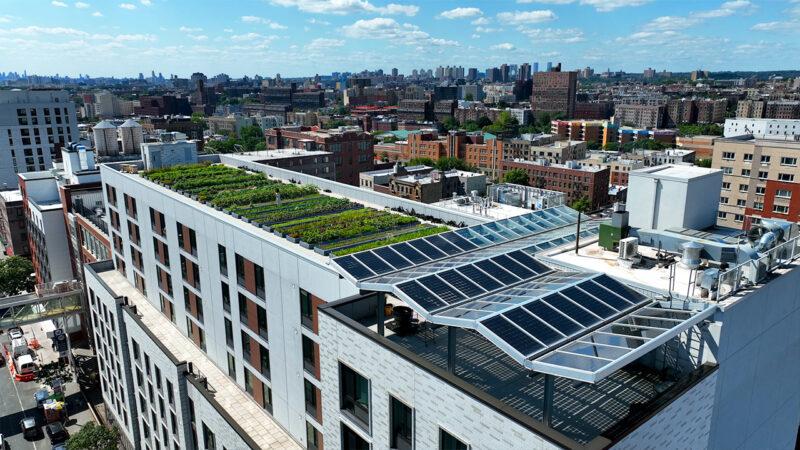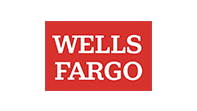The Bronx Development at the Intersection of Sustainability and Affordable Housing
Cooper Gardens housing development at St. Barnabas Hospital provides underserved communities with access to fresh produce, solar energy, and a rooftop beehive.

At the Cooper Gardens housing development in the Bronx, summer is when the amenities shine. There’s fresh produce from the on-site garden, rooftop solar panels taking in the sunlight, and an apiary abuzz with bees.
“It looks beautiful,” said Maria Perez, who has lived in Cooper Gardens for four years. “It’s the perfect place to raise my three boys.”
The development is a far cry from its origins as the parking lot for St. Barnabas Hospital. It’s the realization of the hospital’s chief clinical and strategy officer, Dr. Manisha Kulshreshtha, and her team who aspired to create a place where the community is well fed, well looked after, and receives support to foster a brighter future. “We wanted to make sure this community was able to survive and live here,” said Kulshreshtha.
Blending sustainable housing with support services
Completed in 2019, Cooper Gardens is a $156 million, 450,000-square-foot, multi-building, mixed-use project at the intersection of housing affordability and sustainability. “Sustainability is at the forefront of the projects we develop," said Elaine Braithwaite, senior director for new construction at L+M Development Partners.
St. Barnabas worked with L+M Development Partners to create the modern, urban refuge. It’s equipped with rooftop solar arrays, ENERGY STAR appliances, advanced air filtration, and other sustainable living features. The building rated 99 out of 100 on the Environmental Protection Agency’s ENERGY STAR Portfolio Manager.
“Sustainability is definitely a priority in the affordable housing industry,” said Korbin Heiss, managing director in Wells Fargo’s Community Lending and Investment group. “What’s exciting about this project is that it blends the related elements of health, housing, and sustainability.”
Wells Fargo provided a $67 million Low-Income Housing Tax Credit (LIHTC), as well as a $72 million Letter of Credit to finance the construction. “We’re so grateful for our partnership with Wells Fargo,” Braithwaite said. “It's critical for partnerships like this to happen so that we’re able to develop large-scale, complex, mixed-use projects like at St. Barnabas.”
Creating opportunities for underserved communities
At Cooper Gardens, 30% of the 314 affordable units are dedicated to formerly homeless households. BronxWorks, a nonprofit organization, provides on-site supportive social services, including case management and financial, educational, and vocational resources.
“Affordable housing that comes with support helps ensure that no one has to face eviction or be back on the street,” said BronxWorks’ Shanice John, a licensed social worker and Cooper Gardens supportive housing program director. “They can come down to the office to meet with their case manager or talk to someone who can help them with their lease, scheduling appointments, or enrolling their children in school,” she said. “That kind of on-demand support is really beneficial.”
Studies have shown that living in a stable, affordable home results in stronger outcomes for children, youth, and adults. “Thriving families result in thriving communities in neighborhoods, and ultimately a thriving city,” said Heiss. “It’s really an investment in all of us.”
Wells Fargo works closely with experienced multifamily market-rate and affordable housing developers and investors, as well as mission-oriented for-profits and not-for-profits and Community Development Financial Institutions (CDFIs) that are focused on affordable housing and economic development.
Filling prescriptions for fresh produce
The Cooper Gardens on-site garden is helping to nourish residents providing vegetables like peppers, tomatoes, zucchini, eggplants, and leafy greens.
“When I first moved in, it was wonderful. It was so wonderful,” resident Maria Perez said. “I feel like I’m in my own world.”
Of the 230+ pounds of vegetables produced weekly during the growing season, 60% is given out to the community through a pantry. “We work with food insecure communities throughout New York City. The primary benefit is access to fresh, nutritious, healthy food grown right where people live,” said Linda Goode Bryant, founder of Project EATS. “We fill food prescriptions that doctors prescribe for their patients. It is really exciting that we’re working with a hospital doing that.”
Heiss adds, “Food is so importantly linked to health. Housing, food, schools, green space are all part of the bundle of goods and services that I believe is critical to creating communities that thrive.”
More ways The Bank of Doing supports affordable and sustainable housing solutions
In 2022, Wells Fargo’s Inclusive Communities and Climate Bond allocated $840.4 million to support more than 3,500 affordable units across 10 states. This is in addition to philanthropic efforts, which include:
- Project Homekey Accelerator Grants is a program that allowed the state of California and its housing partners to buy and renovate hotels and other sites to combat the state’s homelessness crisis.
- 90 Sands, a former hotel in New York City, was turned into 491 units of affordable and supportive housing with the help of a $3 million lead grant from Wells Fargo.
- An estimated 1,600 affordable homes will be developed between 2022 and 2027 by the Housing Partnership Network’s Adaptive Reuse Accelerator Program, which the Wells Fargo Foundation funds.
- The Wells Fargo Foundation’s Housing Affordability Breakthrough Challenge offers $1 million to $3 million grants to the winning groups innovating the development of affordable housing in the areas of finance, construction, and resident services.
- A $3.15 million Wells Fargo grant will enable Chicago nonprofit Elevate to decarbonize 100 homes for low- and moderate-income residents and build the capacity and expertise of 24 contractors of color to participate in the green economy.

